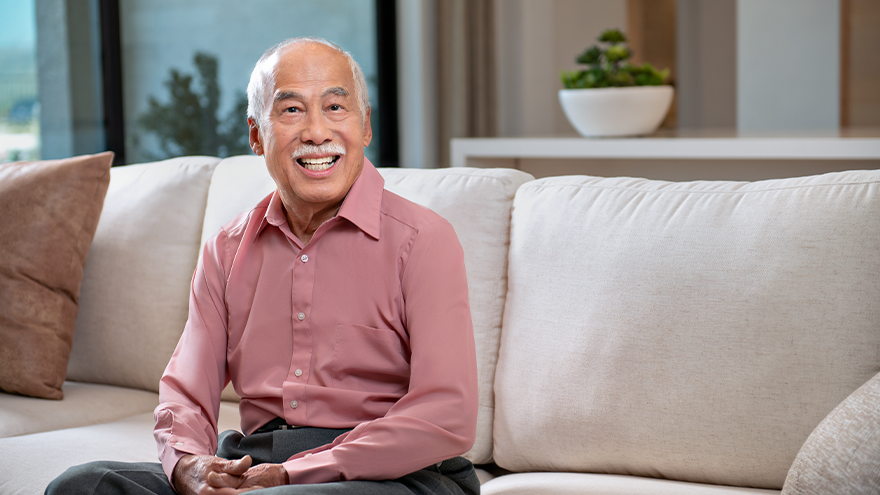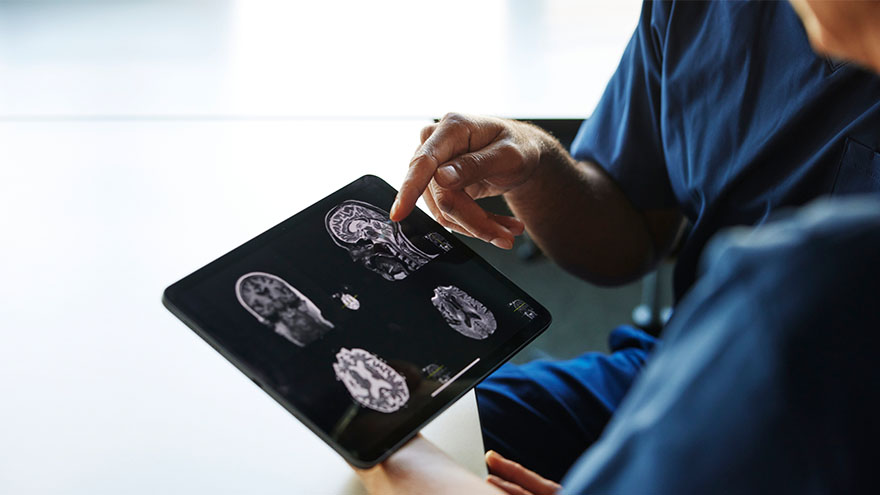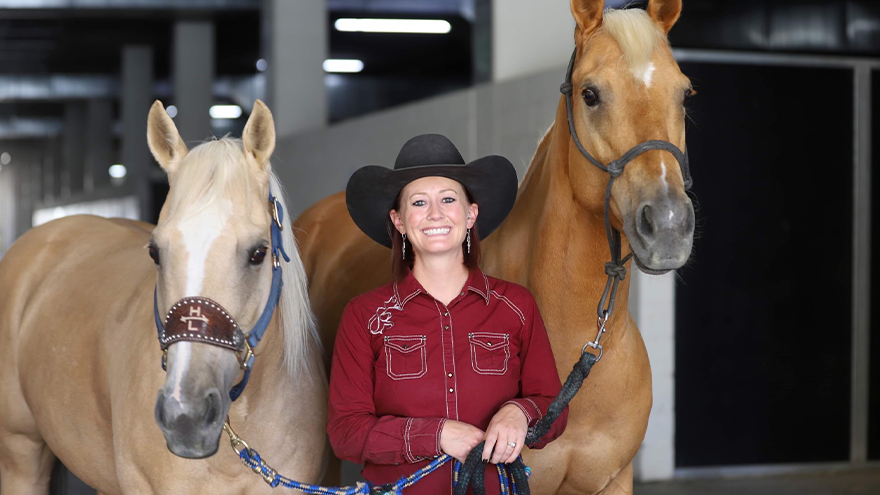Search
-
Understanding the Reasons Behind Heavy Menstrual Cycles
While menstrual cycles can be an annoying inconvenience for many women, heavy bleeding (menorrhagia) is not normal and can disrupt your life. A few days of heavy flow at the start of your period is usually nothing to worry about. However, if you’re frequently experiencing very heavy periods, you should discuss it with your gynecologist or primary care provider. Dr. Megan Fish, an OB-GYN with Renown Women’s Health, discusses various reasons, evaluation and treatment methods when it comes to heavy menstrual cycles. What is classified as heavy menstrual bleeding? The American College of Obstetricians and Gynecologists considers heavy bleeding to be any of the following signs: Bleeding that lasts more than 7 days. Bleeding that soaks through one or more tampons or pads every hour for several hours in a row. Needing to wear more than one pad at a time to control menstrual flow. Needing to change pads or tampons during the night. Menstrual flow with blood clots that are as big as a quarter or larger. What are the most common reasons for heavier periods? A variety of reasons why someone might have heavy periods. Fortunately, most of these problems are treatable. Because each woman's period is unique, only a doctor can definitively determine the cause of your heavy periods. Some of the most common issues that cause heavy periods include: Hormone imbalances such as anovulation, thyroid disease and Polycystic Ovary Syndrome (PCOS). Structural abnormalities in your uterus such as polyps or fibroids. Precancer and cancer such as uterine, cervical, vaginal, ovarian or endometrial hyperplasia. Infections such as chlamydia, gonorrhea, endometritis or vaginitis. Other medical conditions such as liver disease, kidney disease or Pelvic Inflammatory Disease. Medications such as blood thinners and aspirin, hormone replacement therapy, Intrauterine devices (IUDs), birth control pills and injectables. Pregnancy-related problems such as a miscarriage or ectopic pregnancy.
Read More About Understanding the Reasons Behind Heavy Menstrual Cycles
-
Sterling Silver Club Shining Stars: Mark & Dana Combs
Dana and Mark Combs met through mutual friends and had a long friendship before they became a couple in 2009. They were married in 2011 in a private ceremony at a small Reno chapel, and a few months later had a big celebration with their family and friends. Encouraging Others to Succeed Over the years, the happy couple has spent much of their time volunteering and giving back to others in their community. Twenty-six years ago, Mark became a bilateral lower limb amputee. For the past 10 years, he has been a prosthetic consultant, helping other amputees learn how to cope with various challenges and encouraging them to keep living life to the fullest. “Mark is great with helping people,” said Dana. Dana also does a lot of rewarding work through a Philanthropic Educational Organization (P.E.O). She is an advocate for raising money to help women ages 18 and up gain an education. Dana also enjoys tutoring English as a second language. Enjoying Quality Time, Hobbies & Travel When Dana and Mark aren’t helping others, they are spending time with their family and friends, their dog Mia (a 3-year-old Maltipoo) or enjoying one of their many hobbies. Some of Mark’s favorite things to do include playing Solitaire and strumming on his guitar. “I love to garden and play crossword puzzles and word games,” said Dana. “I’m really looking forward to the springtime to spend more time in the garden.” She loves to work out and has a membership at the UFC gym in Reno through her Senior Care Plus gym benefit. Dana also has her own online Etsy store, where she sells homemade jam jars, candle holders and vintage dolls. “Last summer I sold my first edition Barbie that I got when I was 9 years old,” said Dana. “I made quite a profit on it.”
Read More About Sterling Silver Club Shining Stars: Mark & Dana Combs
-
Department Spotlight: Wound Care
For the average person, wounds aren’t an everyday worry. However, for at least eight million Americans, chronic wounds can pose a serious threat to health and well-being. From a person with diabetes experiencing painful neuropathy to a patient healing from a significant burn, caring for advanced wounds is a major part of their healthcare journey. Who do they go to get the care and guidance they need? The answer: Renown Wound Care. Serving patients in both the inpatient and outpatient settings, this department provides comprehensive, best-in-class treatments for severe and chronic wound healing and ostomy care. Our Wound Care team members have mastered the art of harnessing cutting-edge technologies and a patient-centric approach to redefine the standards of healing. Advanced Care for the Best Repair At Renown Health, we are fortunate to have a team full of nurses, physicians and more caring for patients with wounds caused by a wide variety of conditions. Those include: Burns Trauma Vascular diseases Radiation therapy Pressure ulcers Diabetes and diabetic neuropathy Adding to the expert-level continuum of care, Renown is the only health system offering complete ostomy services in the entire region. The Wound Care team helps ostomy patients with the fitting of their medical bags, treatment of any skin conditions that may arise after ostomy bag placement, care coordination and much more. With a multidisciplinary network of experts tailoring personalized treatment plans, there is never a dull moment on the floor. On the outpatient side, the team expects 50-60 patients in one day alone. “As a clinician, wound care is a lot of ‘arts and crafts,’ so we get to use our creative and critical thinking skills to provide the best possible care,” said Samantha Moore, Advanced Wound Care Specialist RN for Outpatient Wound Care. “Each patient has an individualized plan of care – we greet them as they come into the clinic, escort them back to their treatment rooms and get their latest health updates and life situations before providing wound or ostomy care. We prepare each morning doing chart reviews to determine patient needs, wound progression and referral needs.” “We are a highly specialized, dedicated group of professionals with a passion to treat and heal our patients’ wounds,” added Lori Conner, Advanced Wound Care Specialist RN for Outpatient Wound Care. “When a patient comes to our clinic for evaluation, they are given a dedicated appointment to thoroughly go over their medical and surgical history, medications and nature of the wound.” Switching over to the inpatient care team, they operate like a well-oiled assembly line, navigating different daily assignments with precision and flexibility. “On the inpatient side, our day starts in our office with triaging our consult list; after the triage process is completed, we get our assignments, which can consist of wound vacuum-assisted closure (VAC) patients, follow-up patients, ostomy education patients and new wound consults,” said Megan Uy, Advanced Wound Care Specialist RN for Inpatient Wound Care. “In the case of patients requiring wound VAC changes, we consider what kind of pre-medication for pain that they need. Although some patients may be seen on a time schedule, the day ends up flexible as patients are being seen by other specialties. This flexibility also benefits the patients, making them feel more empowered with their care.” “Each day in the inpatient setting, we get to our office and sort through all the new consults that came in overnight, and the charge nurse makes the assignment for the day,” added Madison Arlin, Advanced Wound Care Specialist RN for Inpatient Wound Care. “After the assignment is completed, each nurse is responsible for researching their patients and organizing their day, typically by priority – wound VACs and ostomies usually take top priority.” Now, how do these treatments actually work? This specialized field handles advanced methods of treating each condition, including: Biological skin substitutes Surgical debridement Advanced wound dressings Negative pressure therapy Pre-ostomy markings and education Offloading techniques, such as padding or dressing “Before starting treatments, we communicate with our nurses and providers to make sure that the patient is comfortable prior to wound care,” said Dianna Seo, Advanced Wound Care Specialist RN for Inpatient Wound Care. “After we see the patient, if there is a need for escalated care, we contact the provider for additional testing or consults. We continue to follow-up on patients that have severe wounds, wound VACs and ostomies.” In the hands of the Wound Care team, patients exit our hospital walls not only restored but also empowered, set on a trajectory for long-term healing. Your Expert Care Guides No matter the case or the severity of the wound or condition, patient care, comfort and communication always come first – before, during and after treatment. “Many of our patients have chronic needs, so we end up seeing them for several months, if not years in some cases; we stay up to date with their specific psychosocial needs and help remove barriers that would prevent their wounds from healing,” said Samantha Moore. “I enjoy knowing that my positive attitude can improve our patients’ days,” added Maddie Pauley, Patient Access Representative for Outpatient Wound Care. “When they’re routinely coming to appointments they might not enjoy, hearing them praise our team and give their thanks is one of the most rewarding feelings.” As a wound care patient, there can be a lot of unknowns when beginning their care journey. However, these team members carefully walk each patient through every step from beginning to end. “When we go to see a wound care patient, our team is very consistent about explaining to the patients what our role is and what we plan to do with their wound, and then we continue to actively communicate throughout wound care each step that we are doing as we are doing it,” said Madison Arlin. “We also encourage some of our patients to listen to music that they enjoy during the wound care, or we will cover their eyes with a cloth if they request so that they don't have to see their wound. Sometimes, we will ask the family to stay at the bedside to hold their family member's hand.” Education is crucial to ensuring each patient knows what to expect in order to care for their wound and understanding the stages of healing. Fortunately, this team is well-versed in the world of wound wisdom. “A lot of education is provided on the type of dressing we are applying, and if the patient is going to be performing their own dressing changes, we will go over the entire change with them and provide supplies for discharge,” said Megan Uy. “Additionally, there will be written instructions in their discharge paperwork. In the cases of wound VAC dressing changes, each step is explained to the patient before doing it, and we also go over discharge options and expectations.” “As a clinician who sees a lot of patients prior to having their ostomy placed (pre-surgical marking), one of the most important things we do is first sit with the patient and/or caregivers and talk about their fears, concerns, questions and goals,” said Samantha Moore. “We provide a lot of emotional support and education, helping identify community resources. For our wound patients, we spend a lot of time educating our patients/caregivers about how and why their wounds occurred. We try to connect with them on a personal level and help them identify ways to help their wounds heal.” To see a patient’s care journey from the second they enter through our doors to the moment they return home is one of the most rewarding feelings for the Wound Care teams. In fact, they’ve had the pleasure of treating patients for years and seeing their wounds almost completely heal. The team collectively values the successful healing journeys of their patients as their proudest achievement. “One of our team's greatest accomplishments was being able to see one of our long-term patients discharged with nearly resolved wounds,” said Megan Uy. “This patient had been in our care on-and-off for the past year with many hospitalizations and had complicated high-output enterocutaneous fistulas within his wound bed. These were incredibly hard to keep a dressing on successfully, and he often had issues with the dressing leaking. Eventually, we got a dressing that could remain intact until his next scheduled dressing change, and he was able to get surgery that fixed his fistulas. Being able to see him recover and heal his wounds was a very large accomplishment for us.” The admiration and compassion this team has for their patients also extends to each other. The cohesive way they work together only further benefits their patients, offering the best-possible collaborative care. “We have extremely skilled clinicians in our group that are not only incredible in the work that they do and the patient care that they provide but are also enjoyable to work with as well,” said Geane Weaver, Advanced Wound Care Specialist RN for Inpatient Wound Care. “There is something to be admired in each and every one of my coworkers.” “Our team is very close and supportive of each other at all times,” added Madison Arlin. “I feel very lucky to work with such an amazing group of people. Our team is very proud of the work we do.” Fervently Fighting the Good Fight So, with the highly specialized nature of advanced wound care, how did these team members get inspired to join the Wound Care team in the first place? Well, for many of these devoted employees, their first exposure to caring for wounds took place on different units – sparking their interest in making wound care their full-time career. “Renown was the most welcoming towards me as a student nurse, and I liked that it was a teaching hospital,” said Madison Arlin. “I started in the General Surgical Unit (GSU) immediately after graduating nursing school and worked there for two years before transferring to wound care. I decided to apply to the wound team after watching the wound nurses do wound VACs and ostomy changes on the floor. I would ask them if I could watch, and I was always very fascinated by the wound healing process.” “Prior to joining the inpatient wound team, like Madison, I was also a bedside nurse in GSU,” added Geane Weaver. “Working on that floor, I was already exposed to a lot of patients that were requiring some kind of advanced wound care in one way or another. Working in the GSU, I also cared for a lot of patients that had wound VACs and ostomies. These patients make up a huge group of the individuals that our team sees on a regular basis, and they've always been intriguing for me, so naturally, wound care has always been on my radar.” For other team members, wound care has always been a point of curiosity throughout their education and career. From their very first exposure to this care area, they were hooked. “I was always curious about wound care even through my nursing school experience,” said Dianna Seo. “When I was working on the floor, I would trade to do wound care for patients. When I had time, I would follow wound care and help when I could. I joined the skin team which drove me to be increasingly involved with wound care. As soon as there was a job opening, I applied for the position. I worked in outpatient wound care for approximately four years and now inpatient for another four years. I have enjoyed all aspects of wound care and patient care.” “I had great clinical experience at Renown when I was in nursing school; I also was very interested in caring for trauma patients, and Renown being a Level II trauma center aligned with my interests,” added Megan Uy. “I began my nursing career in the GSU, but my dream job was always Wound Care. During my nursing school clinicals, I had the opportunity to watch some members of the wound team do wound VAC changes and thought it was incredibly intriguing and a great combination of utilizing the knowledge of anatomy and physiology while being creative with handicraft. A position opened on the team around the time I met the prerequisites to be eligible for the position, and luckily, I got it.” Our Wound Care team has achieved significant employee and departmental milestones over the past year, reflecting their dedication to enhancing patient care and overall process improvement. “We have had many accomplishments within the last year and are currently working on more to improve the hospital,” said Dianna Seo. “Madison Arlin won the DAISY Award for her great work with our patients. Megan Uy won Top Talent of the Quarter for helping a stranger. Ande Ferriera has worked tirelessly to improve our process improvement. Allie Saunders, as our leader, has worked to improve patient skin by getting new beds for Renown Regional. All our patients that have healed or are on their way to healing under our care is our greatest achievement that we as wound team is most proud of.” “We are constantly updating protocols, notes and orders for bedside nursing so that it is a more straightforward and seamless charting process,” added Madison Arlin. “We have representatives of different supply companies come and present new products that we think may benefit our patients better. Our wonderful tech has even updated our department site on Inside Renown so that the nurses always have references available.” Renown’s strong influence in the region – and the opportunity to give back to their community – was, and continues to be, a major draw for this team. “Since I can remember, Renown has always been the most prevalent healthcare name for my family and has always taken the most amazing, thorough care of my loved ones,” said Maddie Pauley. “I have always wanted to work somewhere I could help people, and starting at Renown has really opened my eyes into how much of a difference each one of us can make.” Our Wound Care department’s success stories and proactive approach not only reflect their passion for healing but also inspire a ripple effect of positive change throughout our health system. They proudly exemplify a shared commitment to enhancing the well-being of all patients under their care. “Being part of Renown and part of this team has been my blessing; I get to do a job I love with people that love it too,” closed Dianna Seo.
-
The Impactful Role of Renown Health Foundation's Board of Directors
Above: Brian Cushard (left), Renown Health Foundation Board Chair, with his family At Renown Health Foundation, our mission is simple yet powerful – to raise funds that support Renown Health, the largest not-for-profit health system in northern Nevada. We are the driving force behind initiatives that bring state-of-the-art equipment, conduct groundbreaking research, enhance healthcare services, improve patient outcomes and contribute to the overall well-being of our community. Our Dedicated Board of Directors Our impactful work would not be possible without our Board of Directors – a fantastic team of 27 local volunteers. They bring diverse skills to the table, working together to create positive changes in healthcare for northern Nevada. Our board is at the core of our Foundation's success by guiding important decisions, sharing valuable insights and actively engaging in community relationships. Meet Brian Cushard – Renown Health Foundation’s Chair Brian Cushard took on the role of Foundation Board Chair at the beginning of 2024. Brian, who is the President of LP Insurance Services in Reno, will lead us for the next two years, bringing a wealth of experience and a deep commitment to community well-being. Since joining Renown Health Foundation’s Board in 2018, Brian has been instrumental in shaping our strategic direction. Brian’s Vision: Advocating for Renown Health’s Mission and Making a Difference We had the opportunity to sit down with Brian and explore his passion for healthcare philanthropy and the positive changes he envisions. Brian's 'why' is firmly rooted in the belief that a robust health system serves as the backbone of the community. His vision extends beyond fundraising; it's about inspiring the community by sharing remarkable stories of care and championing Renown's impactful contributions. Q: Why does Renown's mission matter to you, and how do you see your role making a difference? A: Renown's mission matters deeply to me because, without a highly functioning healthcare system, the economic structure of the community can be impacted. At LP Insurance, where I work, we see ourselves as guardians of our clients' hopes and dreams. This translates to my role on the Board as stewards for the health of others. Advocating for a highly functioning health system is crucial in supporting community members and clients alike. Surrounding ourselves with a solid network is essential. As advocates, our voices are integral in ensuring that everyone's voices are heard. Q: Can you share a moment that made you want to support healthcare causes? A: There are those stop-in-your-tracks healthcare moments that make you reassess life's priorities. I've had moments where life comes to a standstill, and what you once thought was important takes a backseat to the basics of life—getting better, one step at a time. In those vulnerable moments, you realize the importance of every person at the hospital. In desperate need, we rely on them. It's eye-opening and gives perspective on what's truly valuable in life. Q: Tell us about a time when you saw the positive impact of healthcare or philanthropy. How did that influence your decision to get involved? A: One impactful moment in philanthropy stands out — the Music and Miracles concert featuring the Beach Boys. LP Insurance was a major donor, contributing $100,000 to benefit Sophie’s Place, a music therapy room coming to Renown Children's Hospital. On the day of the event, my wife and I volunteered and saw the remarkable community support for Renown Children’s Hospital. The collective efforts that day raised over $1 million, specifically designated to establish Sophie’s Place. This experience inspired me to want to do more, as I recognized the profound positive impact that philanthropy can have on healthcare and the community. Note: Sophie’s Place, opening later this year, will offer vital care and healing experiences for young patients at Renown Children’s Hospital.
Read More About The Impactful Role of Renown Health Foundation's Board of Directors
-
Life after Lymphedema Diagnosis: What to Expect
Managing lymphedema effectively is essential for enhancing the quality of life for individuals affected by this condition. Katherine Bunker, a Physical Therapist and Certified Lymphedema Therapist (PT, DPT, CLT) at Renown, has expertise in this area and her insights offer valuable strategies for managing lymphedema. Lymphedema is a chronic condition characterized by swelling in one or more limbs due to a blockage in the lymphatic system. This condition can result from cancer treatments, surgery, infection, or can sometimes be congenital. While it can be challenging to live with lymphedema, understanding the condition and adopting specific lifestyle changes and strategies can significantly improve the quality of life. Understanding Lymphedema Educating yourself about lymphedema is crucial. Understanding the causes, symptoms, and potential complications can provide you with the tools to manage the condition proactively. Lymphedema can lead to discomfort, decreased mobility, and in severe cases, infections such as cellulitis. Therefore, recognizing the early signs and knowing when to seek medical advice is essential. Medical Management Consulting with healthcare professionals who specialize in lymphedema is critical. A physiotherapist or occupational therapist trained in lymphedema management can tailor a treatment plan for you that can include the following: Compression Therapy - Wearing prescribed compression garments can help move the lymph fluid and reduce swelling. It’s essential to get fitted by a professional and understand how to use these garments correctly. Manual Lymphatic Drainage (MLD) a gentle massage technique that encourages the movement of lymph fluid out of the affected limb. It’s typically performed by a trained therapist but ask about self-massage techniques you can do at home.
Read More About Life after Lymphedema Diagnosis: What to Expect
-
Get to Know Sterling Silver Club Member Hanley Wong
This summer, we’re excited to introduce our featured Sterling Silver Club member, Hanley Wong. You may recognize him from the newest Senior Care Plus television commercial that has been airing locally since last October. Hanley happens to be a former employee of Renown Health and worked in the information technology (IT) department for 13 years. Today, he’s enjoying his retirement here in northern Nevada, with the occasional traveling to visit his family. Looking Back Hanley was born in San Francisco in 1944. He was in the U.S Army Reserve from 1966-1972, having traveled to various places including North Carolina, Salt Lake City, Long Beach, Hong Kong and Taiwan. While he was in the U.S. Army Reserve, he also attended college part-time and graduated from San Francisco State University in 1970 with a degree in business administration, emphasis in accounting. Hanley went into the IT field after he gained computer experience through his accounting background. “I started learning how to program with computers, then became a systems engineer where I did troubleshooting, maintenance and more,” said Hanley. “I’ve always enjoyed the challenging work in the IT field, and I got to meet all kinds of people.” Hanley started his first IT job at a small insurance company in San Francisco. He went on to work for the GAP headquarters and met his late wife there, who also worked for the company. They were married for 40 years and had two sons together. The family moved to Reno 21 years ago when Hanley was recruited by Washoe Medical Center, before it became Renown Regional Medical Center. “My favorite part about working at Renown was the camaraderie in the IT department; it was like a big family,” said Hanley. “I enjoyed making employees happy by solving their computer problems.” In 2005, Hanley was part of the team that helped install Epic, Renown’s electronic medical record system. Through that project, he traveled to a few different conferences and trainings with his team.
Read More About Get to Know Sterling Silver Club Member Hanley Wong
-
Understanding Alzheimer's and Brain Health
June is Alzheimer’s and Brain Awareness month, designed to raise awareness about Alzheimer’s disease and other forms of dementia and recognize the importance of brain health. At Renown Health, we are committed to providing exceptional care through our Memory Disorders Program, dedicated to accurately diagnosing and treating various causes of memory loss and cognitive decline. Understanding Alzheimer’s and Dementia Alzheimer’s disease, the most common form of dementia, affects millions of people worldwide. It is a progressive disorder that leads to a steady decline in memory, thinking, and reasoning skills. Early symptoms include forgetfulness, difficulty performing familiar tasks, and language problems. As the disease advances, individuals may experience disorientation, mood changes, and a loss of interest in daily activities. Dementia encompasses a range of symptoms associated with cognitive impairment that is severe enough to interfere with daily life. It is not a specific disease but a descriptive term for the collection of symptoms resulting from various brain disorders, including Alzheimer’s disease. Renown Health’s Comprehensive Approach The Renown Memory Disorders Program offers a comprehensive approach to diagnosing and treating memory-related conditions. Our experts, including Dr. Jon Artz and Dr. Davor Zink, specialize in cognitive rehabilitation, a therapy designed to restore, strengthen, and sharpen cognitive functions. This therapy includes cognitive exercises, hands-on activities, and strategies to enhance daily living. We treat a wide array of patients, from those with mild cognitive impairment to individuals in the early stages of Alzheimer’s. Our program is structured to support those 60 years and older experiencing memory problems, high-functioning individuals with memory issues, and those referred to a neurologist for further evaluation.
-
Childproof Your Windows - 8 Tips to Avoid Falls and Ensure Safety
Enjoying the fresh air through an open window is one of the many ways to enjoy the weather. However, open windows can pose safety risks, including injury or fatalities for young children aged two to five. We spoke with Jorge Montano-Figueroa, Pediatric Injury Prevention Specialist at Renown Children’s Hospital to understand how window falls can be prevented through safety devices and practicing careful habits. Use these tips to keep your children safe from window falls. Supervise Young Children: Always keep an eye on young children, especially when they are near windows. Supervision is the first line of defense against accidents. Keep Windows Closed and Locked: When possible, keep windows shut and secure. Locked windows prevent children from opening them and potentially falling out. Open Windows from the Top: If your windows allow, open them from the top down rather than the bottom up. This reduces the chance of children reaching the opening. Ensure that the opening is limited to four inches or less to prevent accidental falls. Install Child Safety Devices: For windows six feet or more above the ground, child safety devices such as window stops or guards are a must. These devices are readily available at hardware stores and for purchase online. They are designed to be easy for an adult to release in an emergency but secure enough to prevent a child from opening the window too wide. • Window Stops: These devices prevent windows from opening more than four inches, significantly reducing the risk of falls. • Window Guards: For windows that need to open more than four inches, window guards provide a barrier to prevent falls while allowing ventilation. Keep Climbing Hazards Away: Move furniture and other items that children could use to climb away from windows. Items such as chairs, beds, and couches can be stepping-stones for curious children. Establish a Safety Zone: Make it a household rule that children should play at least two feet away from windows. This safety zone helps keep them keep potential hazards out of reach. Childproof When Visiting: When visiting homes that may not be childproof, take extra precautions. Close and lock windows during your visit and watch your child closely to ensure they stay safe. Remember: Window Screens Are Not Safety Devices: Window screens are designed to keep bugs out, not children in. Screens can easily pop out if a child leans or pushes against them, leading to falls. Always use proper child safety devices instead of relying on window screens. By taking these precautions, you can significantly reduce the risk of window falls and keep your children safe. A few simple steps and some vigilance can make a big difference in preventing these potentially tragic accidents. For more information and to learn more, visit Pediatric Injury Prevention.
Read More About Childproof Your Windows - 8 Tips to Avoid Falls and Ensure Safety
-
Meet Haley Longfield: A Renown Radiation Therapist & Barrel Racer
Many Renown Health employees have deep roots in the northern Nevada community and Haley Longfield is one of them. She’s a fifth-generation northern Nevadan currently living in Fernley and commuting to Reno three days a week for her job as a Radiation Therapist for the William N. Pennington Cancer Institute at Renown Health. She’s also a wife, mother of a 1-year-old, and an avid horseback rider who enjoys the western way of life. This year, Haley is excited to compete in the Reno Rodeo for a second time. A Life-Long Passion Haley started riding horses in the fourth grade and quickly fell in love with it. A few years later, she started barrel racing and developed a profound love for the adrenaline-filled sport. “When I turned 18, my dad gave me all of the responsibility of owning a horse,” said Haley. “Ever since then, I’ve been paying for and taking care of my own horses.” As many who know and love horses would likely agree, Haley says they are therapeutic for the mind, body and soul. “Riding horses is a great way for me to use my brain and focus, or think about nothing at all,” said Haley. Recently, Haley qualified to compete in this year’s Reno Rodeo in barrel racing with her 7-year-old mare named Hershey. “The first time I competed in the Reno Rodeo was quite a few years ago with my high school rodeo horse, and Hershey is the granddaughter of that horse,” said Haley. “The thing that I’m most excited about in competing at this year’s Reno Rodeo is getting to ride a homegrown horse in my hometown rodeo – she’s gorgeous, easy-going and gives it her all.” Above: Haley Longfield on her horse Hershey at a barrel race Circle of Support Haley feels grateful to have the support of her family, friends and team at Renown. “In addition to my family and friends, I have an incredible team at Renown that cheers me on both in my professional and personal endeavors,” said Haley. “I couldn’t do it all without them.” Alongside qualifying for the Reno Rodeo, Haley also recently received her bachelor's degree in applied science with an emphasis in radiation therapy. Her career development goals consist of moving into leadership within her department. “My leader and team have been nothing but supportive of my goals. Our leader is invested in everyone’s personal development and aspirations, as well as our professional and career development,” said Haley. “I’m excited to one day follow in my leader’s footsteps and help employees in our department reach their own goals. I aspire to become a great leader like she’s been to us.”
Read More About Meet Haley Longfield: A Renown Radiation Therapist & Barrel Racer
-
How to Spot Depression in Men
Is a man in your life struggling with depression? Many men find it difficult to acknowledge when they need help. Recognize their unique warning signs of depression with insights from psychologist Dr. Herbert Coard. Over 6 million men are diagnosed annually, often displaying symptoms like anger and aggression instead of sadness. Learn how to support them and understand these often-misinterpreted indicators. Behavioral Signs of Depression in Men High levels of the hormone cortisol are released during stressful situations affecting the neurotransmitter, serotonin (a feel-good hormone), contributing to depression. You can identify depression or suicidal tendencies by paying close attention to the following behavioral changes: Anger, irritability, or aggression Avoiding family or social situations Losing interest in family responsibilities, passions and hobbies Lack of sex drive Becoming controlling/abusive in relationships Risk-taking behavior such as; unsafe sex, overspending or gambling Not being able to concentrate or remember details Excessive drinking or drug use Having frequent thoughts about death Talking about suicide Attempting suicide Factors That Lead to Depression in Men Life Events Work stress or long-term unemployment can be huge contributing factors relating to depression. This type of life event can be overwhelming, making it impossible for a man to cope. Changes in Relationships The loss of a relationship can be a significant contributing factor to the emergence of depressive symptoms and past experienced physical, sexual, or emotionally abusive relationships. With this in mind, counseling can often help individual to overcome this type of trauma. Grief and Loss Overwhelming sadness due to the loss of a loved one can trigger depression. Although normal, each person goes through their own grieving period. For example, normal responses to death are insomnia, poor appetite and loss of interest in activities. Pay attention if grief seems prolonged or out of the ordinary. Health Problems In particular, depression coexists with medical conditions. As men age, this can be passed off as normal aging, but it could be more serious. In addition, illnesses such as thyroid disorders, Addison’s disease and liver disease can cause depressive symptoms. Diabetes, cancer, heart disease, or Parkinson’s disease can affect any age, thus triggering or worsening depression. Some older men also feel like they may be suffering from dementia because of difficulties with memory this may be a symptom of depression. A trip to the doctor may be in order to help alleviate concern and worry. Depression in Men and Suicide Frequently the emotional pain occurring with depression can distort a man’s ability to see a solution beyond suicide. Individuals with depression become very rigid and constricted in the way they solve problems. The statistics below speak for themselves, helping us understand the need to reach out to those who need our support. Male suicide rates are on rising – men die by suicide 3.53 times more often than women, accounting for 70% of all suicides. Sadly, every day 129 men commit suicide. White males accounted for 69.67% of suicide deaths in 2017. In 2017, firearms accounted for 50.57% of all suicide deaths. Middle aged Men who are middle aged have the highest suicide rates. 40% of those identifying as transgender have attempted suicide in their lifetime. Males who are guy or transgendered are at an increased risk for suicide attempts, especially before age 25. Veterans often suffer from post-traumatic stress disorder (PTSD) and depression, and are more likely to act on a suicide plan. How You Can Help Now that you can identify some of the warning signs of depression, here’s how you can help: Talk about your concern and communicate that you’re there to help him. Let him know depression is a medical condition and will usually get better with treatment. Suggest professional help from a Primary Care Provider, Psychologist or Therapist. Help set up appointments and offer to accompany him – let him make the decision, but make it clear you’re there for him, no matter what he decides. If you feel he is in a dire or life-threatening situation, contact 911. Call the National Suicide Prevention Lifeline at 1-800-273-TALK (1-800-273-8255) to talk to a trained counselor. Call the Veteran’s Crisis Line at 1-800-273-TALK (1-800-273-8255) and press “1”
-
8 Important Health Screenings for Men
Men are generally less likely to visit their doctor for exams, screenings, and consults compared to women. To address this, we've collaborated with Dr. Bonnie Ferrara of Renown Health, to compile a list of eight essential screenings that can help men maintain their health. 1. Blood Pressure Tests Ages 20+ Blood Pressure tests measure the pressure in your arteries as your heart pumps. Biennial (every two years) checks are recommended if you have normal blood pressure or more frequently if you have high blood pressure (hypertension) or low blood pressure (hypotension). The United States Preventative Services Taskforce cites normal blood pressure below 120 systolic (top number) and 80 diastolic (bottom number). 2. Cholesterol Screening Ages 20+ High levels of cholesterol increase your risk of stroke and heart disease. A simple blood test will help your healthcare provider determine your numbers and if you're at risk. If you have a family history of diabetes or heart disease, you may need yearly screenings. But, again, your doctor can provide the best course of action.
-
Summer Buddha Bowl
Say Hello to Summer in a Bowl If you've wanted to add a heart-healthy dish to your recipe repertoire, now's the time. This tasty vegan bowl loaded with turmeric chickpeas, marinated tofu and quinoa offers essential nutrients and beneficial fats to help maintain healthy cholesterol levels and reduce the risk of heart disease.


.png?rev=5ac90884d83d45468d7e3a5389920ff1)








